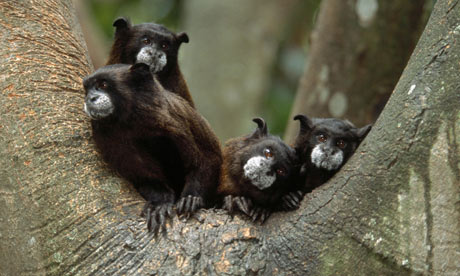France and Japan propose an 'IPCC for nature'
Delegates from 97 countries meet in South Korea to hear plans for an international body to monitor destruction of flora and fauna
• 'Human wellbeing is utterly dependent on the natural world'
• Biodiversity crisis – species loss could cost us the Earth

World governments are meeting this week to try to set up a new international body that would put the global destruction of the natural world on an equal footing with the threat of climate change.
The proposed new organisation would be modelled on the Intergovernmental Panel for Climate Change (IPCC), which was set up 22 years ago.
Since then, it has launched global warming and climate change to the top of the political and economic agenda.
The meeting, at Busan in South Korea, follows growing evidence in the last few years about the huge rate of destruction of species and the ecosystem services they provide for humans – from regulating local weather and fertilising soil to providing a rich gene pool for medical researchers.
Another major report this summer, commissioned by the United Nations, is expected to say that the economic benefits of policies to protect and restore biodiversity are worth 10 to 100 times the costs
"If the true value of ecosystem services – economic, social and spiritual – were factored into decision-making, wetlands, forests and reefs would be viewed and treated very differently," said French ecology secretary, Chantal Jouanno, and campaigner Janet Ranganathan in an article for the Guardian.
"How to ensure cross-governmental participation and buy-in is therefore the key question for countries gathering at Busan.
"The future health of the natural world, and humanity's wellbeing, may depend on it."
The proposed "IPCC for nature" could provide regular, independent reports on the state of global and regional biodiversity – reflecting the IPCC's five-yearly assessments of the state of climate science, forecasts for impacts and advice about how to tackle the problem.
Perhaps more important would be the symbolic significance of an organisation which sent out a message that governments and global organisations were finally taking the biodiversity crisis as seriously as they have climate change, say supporters.
"Climate change may have captured public attention, but the global collapse of ecosystems and loss of biodiversity is equally threatening to human wellbeing," said Ranganathan, a vice-president of the World Resources Institute.
"The IPCC helped give climate change a global profile. The time has come for an IPCC for nature."
The creation of the body, provisionally named the Intergovernmental Platform on Biodiversity and Ecosystem Services (IPBES), was first formally proposed last year.
This week delegates from 97 governments and 50 organisations are meeting for what could be the official go-ahead for the new body.
The Busan effort has been championed by the Japanese and French governments and supported by others including the UK, which is helping fund the event.
The IPBES website reported there was "overall support" for the proposed new body.
But crucial decisions need to be made, including how independent it would be of other international bodies and whether its remit would include primary research.
A more likely scenario is that it would focus on co-ordinating research and filling in "knowledge gaps", developing tools for policymakers and skills training in developing countries.
Other details, such as which countries would be members, where it would be based and how it would be funded also need to be ironed out.
"I would say the tone of the conversation is supportive, but there's a lot of work to be done to agree on extremely important issues," said Professor Bob Watson, chief scientist at the Department for Environment, Food and Rural Affairs and vice chair of IPBES. "I'd hope by Friday we'd come to agreement."
Responding to likely concerns that the IPCC model has been discredited – at least with the public – by stories about mistakes in its last assessment report and allegations that scientists at one of the leading research centres, the University of East Anglia, had withheld data improperly, Watson added: "We are looking at what should be similar or dissimilar to the IPCC."
As well as giving regular reports, the IPBES could co-ordinate international and regional research, advise policymakers on how to protect and restore habitats and help to build the "capacity" to do research.
The proposed new body might also encourage more research into links between biodiversity and climate change.
IPBES initiatives could possibly also chime with the proposed "barometer of life" which would monitor 160,000 of the world's 2 million known species to track the changing fortunes of the natural world.

No comments:
Post a Comment
the mikiverse loves free speech and wholeheartedley accepts, that someone who is diametrically opposed to my views is free to promulgate those thoughts...However, misogyny, racism, intolerance etc will see that comment deleted.
These abstract considerations will be solely, and exclusively determined by the mikiverse, so play hard, but, nice.